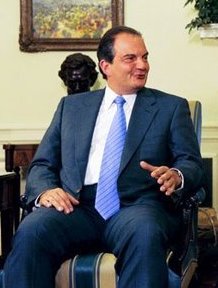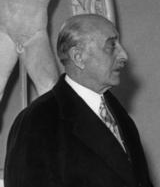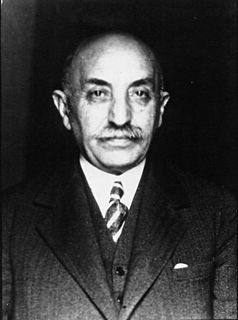| |||||||||||||||||||||||||||||||
All 300 seats of the Greek Parliament 151 seats were needed for a majority | |||||||||||||||||||||||||||||||
|---|---|---|---|---|---|---|---|---|---|---|---|---|---|---|---|---|---|---|---|---|---|---|---|---|---|---|---|---|---|---|---|
| |||||||||||||||||||||||||||||||
| |||||||||||||||||||||||||||||||
 |
|---|
| This article is part of a series on the politics and government of Greece |
Parliamentary elections were held in Greece on 19 February 1956. [1] The result was a victory for Constantine Karamanlis and his National Radical Union party by securing the electoral vote despite trailing in the popular vote. It was the first general election in Greece in which women had the right to vote, although women had first voted in a by-election in Thessaloniki Prefecture in 1953 in which the first female MP was elected.

Greece, officially the Hellenic Republic, self-identified and historically known as Hellas, is a country located in Southern and Southeast Europe, with a population of approximately 11 million as of 2016. Athens is the nation's capital and largest city, followed by Thessaloniki.
The National Radical Union was a Greek political party formed in 1956 by Konstantinos Karamanlis, mostly out of the Greek Rally party.

Women's suffrage is the right of women to vote in elections. Beginning in the late 1800s, women worked for broad-based economic and political equality and for social reforms, and sought to change voting laws in order to allow them to vote. National and international organizations formed to coordinate efforts to gain voting rights, especially the International Woman Suffrage Alliance, and also worked for equal civil rights for women.
Contents
Although the Liberal Democratic Union, a coalition of centrist parties, received a slim plurality of votes, the conservative governing party, the National Radical Union, won the most seats due to a complex and controversial electoral system enacted by Karamanlis. A "first past the post" system was applied in the rural constituencies where the ERE was expected to gain a plurality, while proportional representation was reserved for the urban constituencies, where the Liberal Democratic Union was expected to lead. [2] [3] As a result, the Liberal Democratic Union came up 19 seats short of a majority.
The Liberal Democratic Union was a coalition of six Greek political parties for the elections of 1956.
Proportional representation (PR) characterizes electoral systems in which divisions in an electorate are reflected proportionately in the elected body. If n% of the electorate support a particular political party, then roughly n% of seats will be won by that party. The essence of such systems is that all votes contribute to the result - not just a plurality, or a bare majority. The most prevalent forms of proportional representation all require the use of multiple-member voting districts, as it is not possible to fill a single seat in a proportional manner. In fact, the implementations of PR that achieve the highest levels of proportionality tend to include districts with large numbers of seats.
The Liberal Democratic Union included the Liberal Party, led by Sophoklis Venizelos and Georgios Papandreou, as well as the left-wing EDA, led by Ioannis Passalidis. A few years later, Georgios Papandreou and Sophoklis Venizelos renounced their alliance with EDA, breaking up the Liberal Democratic Union.
The Liberal Party, also the National Progressive Centre Union since 1952, was a major political party in Greece during the early-to-mid 20th century. It was founded in August 1910 by Eleftherios Venizelos and went on to dominate Greek politics for a considerable number of years until its decline following the Second World War. Among its most well-known members, apart from Venizelos, were Alexandros Papanastasiou, Nikolaos Plastiras, Georgios Papandreou and Konstantinos Mitsotakis.

The United Democratic Left was a political party in Greece, active mostly before the Greek military junta of 1967–74.
Ioannis Passalidis was a prominent member of the Greek Left and founder of the United Democratic Left party.













